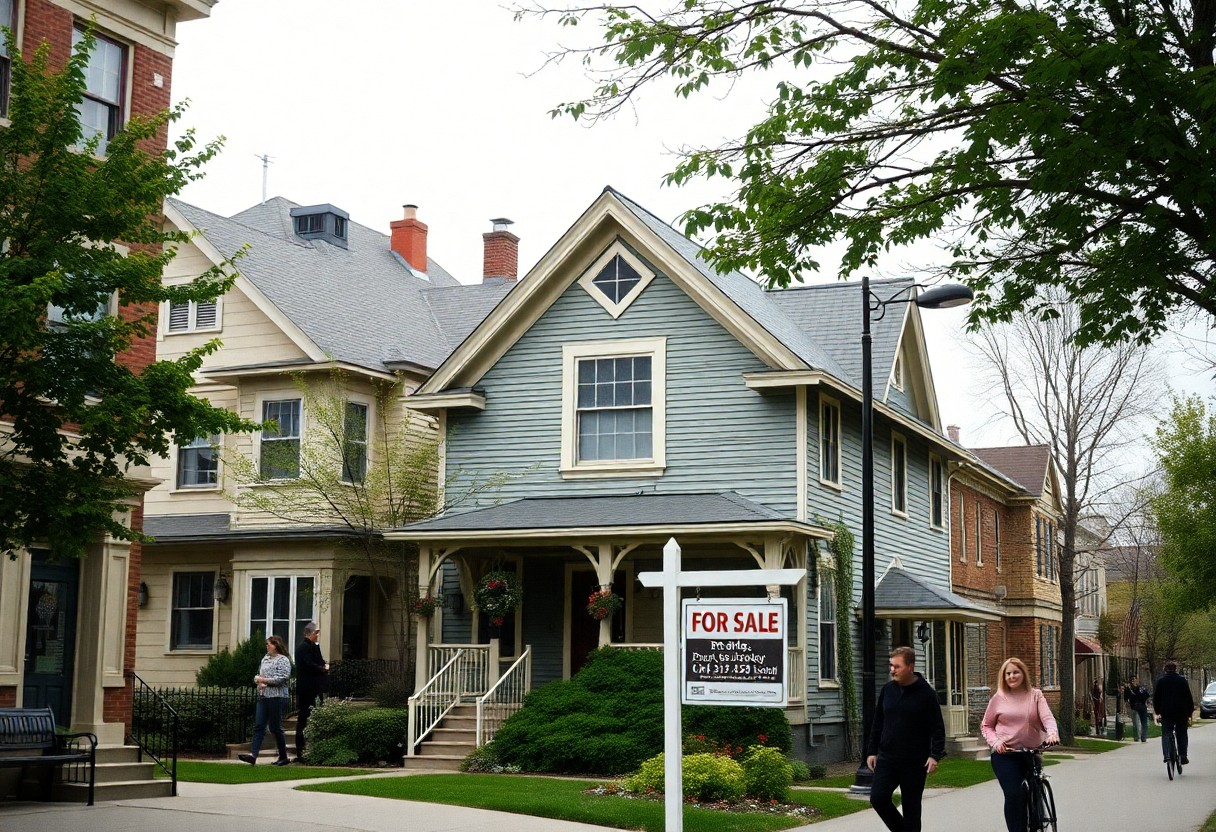Invest in Ann Arbor real estate with confidence by following this comprehensive guide tailored for first-time investors. This vibrant city, known for its rich culture and educational opportunities, presents a unique landscape for profitable real estate ventures. You’ll navigate imperative strategies and insights, empowering you to make informed decisions and maximize your investment potential in this thriving market. Let’s examine the steps you’ll need to take to successfully invest in Ann Arbor’s real estate scene.
Key Takeaways:
- Research the local market trends and neighborhoods in Ann Arbor to identify potential investment opportunities that align with your budget and goals.
- Consider working with a real estate agent who specializes in Ann Arbor to gain insights and assistance in navigating the buying process.
- Evaluate financing options, including traditional mortgages, loans, or investment partnerships, to determine the best approach for funding your investment.
Types of Real Estate Investments
While exploring the real estate market in Ann Arbor, you will discover various types of investments that suit your financial goals and risk tolerance. Understanding these options is necessary for maximizing your investment potential. Here are the primary categories of real estate investments you might consider:
- Residential Properties
- Commercial Properties
- Industrial Properties
- Land Investments
- Real Estate Investment Trusts (REITs)
Any of these types of investments can provide you with an opportunity to build wealth, generate income, and diversify your portfolio, but you should choose wisely based on your resources and market outlook.
| Type of Investment | Description |
|---|---|
| Residential Properties | Investments in single-family homes, apartments, and condos. |
| Commercial Properties | Properties used for business purposes, including office spaces, retail stores, and warehouses. |
| Industrial Properties | Facilities used for manufacturing, production, or distribution. |
| Land Investments | Purchasing undeveloped land for future residential or commercial use. |
| REITs | Investment companies that own, operate, or finance real estate. |
Residential Properties
Types of residential properties, such as single-family homes, duplexes, and multi-family apartments, offer numerous opportunities for first-time investors. These investments can provide you with steady rental income and potential appreciation in value over time. Furthermore, Ann Arbor’s vibrant community and growing population make residential properties an attractive option for long-term investment strategies.
When investing in residential properties, consider the location, market demand, and property condition. You may also want to analyze the potential rental income, as this will contribute to your cash flow and overall return on investment. You should keep an eye on local zoning laws and regulations, to ensure that your investment aligns with your long-term objectives.
Commercial Properties
The commercial real estate market consists of properties intended for business use, including office buildings, retail spaces, and industrial facilities. Investing in commercial properties typically requires a larger upfront capital investment compared to residential properties, but they can offer higher returns and longer lease terms. Understanding market trends and tenant needs is vital for maximizing your investment success in this sector.
This section of real estate can be lucrative if you approach it with careful research and planning. Given Ann Arbor’s reputation as a bustling college town with thriving businesses, you may find excellent opportunities for commercial investments. It is also wise to evaluate the specific needs of tenants in the area, as this can significantly impact your property’s occupancy rates and rental income. Be sure to assess the potential for growth in the surrounding area, as this will influence both demand and property values over time.
1. Research Ann Arbor’s real estate market trends thoroughly.
2. Set a clear budget for your investment.
3. Identify target neighborhoods with growth potential.
4. Connect with local real estate agents for insights.
5. Evaluate properties based on cash flow and appreciation.
6. Make an informed offer and complete necessary inspections.

Tips for First-Time Investors
Clearly, entering the world of real estate investment for the first time can feel overwhelming, but there are key strategies to help you navigate this journey successfully. Here are some important tips to keep in mind:
- Set clear investment goals to align with your financial outlook.
- Determine your budget and stick to it.
- Evaluate various property types to find your niche.
- Network with experienced investors and real estate professionals.
- Always conduct due diligence before making a purchase.
This will provide you with a solid foundation to build your real estate portfolio and achieve long-term success.
Researching the Market
Investors should start by understanding the Ann Arbor real estate landscape to maximize their chances of success. Familiarize yourself with local property values, market trends, and the economic indicators that could influence real estate demand in the area. Use online resources, attend local real estate seminars, and follow relevant market reports to gain insight into which neighborhoods are rising in popularity and which ones are stable.
Additionally, keep an eye on factors such as job growth, school district ratings, and future developments in infrastructure, as these elements can significantly impact property appreciation. By performing thorough research, you position yourself to make informed decisions based on current and future market dynamics.
Building a Reliable Team
With your investment goals and market research in place, the next step is to assemble a reliable team to support your real estate endeavors. Engaging with professionals such as realtors, property managers, contractors, and financial advisors can provide you with critical insights and services that will enhance your investment journey. A well-rounded team not only fills the gaps in your knowledge but also leverages their experiences to help you avoid common pitfalls.
A solid real estate team should include individuals with a proven track record and relevant industry expertise. Take the time to interview potential team members, checking their references and backgrounds to ensure they align with your investment philosophy. Establishing a trustworthy network will allow you to focus on making strategic decisions while they handle the intricacies of the real estate market on your behalf.
Step-by-Step Investment Process
Now that you are ready to investigate the Ann Arbor real estate market, it’s vital to follow a structured investment process. This guide outlines a clear step-by-step approach that you can use to ensure you’re making informed decisions and maximizing your potential returns.
| Step | Description |
|---|---|
| Set Your Goals | Define what you want to achieve with your investment. |
| Research the Market | Analyze property values, neighborhoods, and trends. |
| Financing Your Investment | Explore your financing options to fund your investment. |
| Property Acquisition | Identify and acquire a suitable property. |
| Management and Maintenance | Manage your property effectively for optimal returns. |
Setting Your Goals
Setting specific goals is the first step in your investment journey. Consider what type of investment aligns with your personal financial objectives. Are you looking for short-term gains from flipping properties or a long-term strategy focused on rental income? Defining your goals will not only clarify your intentions but will also guide your decision-making throughout the investment process.
Additionally, take into account your risk tolerance and the amount of time you can dedicate to managing your investment. Be realistic about your expectations and ensure your goals are achievable based on your current financial situation. This foundational step will provide you with a roadmap for your real estate investment journey, helping you stay focused and motivated.
Financing Your Investment
Process of financing is another vital area you need to navigate carefully. Before you start looking seriously at properties, assess your financial situation and explore various financing options available to you. This could include traditional mortgages, private lenders, or even partnerships that allow you to pool resources with other investors.
This initial step involves not just securing funding but also understanding the implications of each financing option on your cash flow and overall investment goal. Consider factors such as interest rates, repayment terms, and the potential for leverage. By thoroughly evaluating your financing strategies, you equip yourself with the tools necessary to make informed investment decisions and enhance your financial viability in the competitive Ann Arbor real estate market.
Key Factors to Consider
Once again, delving into the Ann Arbor real estate market means paying attention to several key factors that can influence your investment decisions. Being informed about these aspects can significantly enhance your chances of achieving success as a first-time investor. Consider the following:
- Market trends and property values
- Local job growth and economic stability
- Demographic shifts and population growth
- Accessibility to schools and amenities
- Future development plans in the area
Though these components may seem ordinary on the surface, they play a significant role in shaping the overall investment landscape in Ann Arbor. Thou must equip yourself with this knowledge to make educated decisions and maximize your returns.
Location and Neighborhood Trends
On the real estate journey, understanding the importance of neighborhood trends is vital for your investment strategy. Ann Arbor is known for its vibrant communities and diverse cultural offerings. As you evaluate potential properties, focus on areas that show signs of growth, such as new businesses opening and increased amenities. Researching local school districts and public services can also provide valuable insight into the desirability of a neighborhood, which can impact property values and rental rates.
Moreover, consider the accessibility of your chosen neighborhood. Proximity to public transportation, major highways, and downtown Ann Arbor can give your property a competitive edge in the rental market. As a first-time investor, your goal should be to pinpoint neighborhoods that are not only currently performing well but also have the potential for appreciation in the long run.
Property Management Options
Management is a fundamental aspect of real estate investing that can significantly influence your overall success. As a first-time investor, you may choose between managing the property yourself or hiring a property management company. If you opt for self-management, be prepared for responsibilities like tenant screening, maintenance, and handling emergencies. It can be a rewarding experience but may also be time-consuming. On the other hand, a reputable property management company can take the burden off your shoulders by efficiently handling leasing, maintenance, and tenant relations, allowing you to focus on other ventures.
It’s important to evaluate the costs associated with hiring a property management company versus the advantages it provides. Assess your own comfort level with managing properties, and consider the potential time and financial implications. Ultimately, your choice should align with your investment strategy and personal circumstances, ensuring that you feel confident in your approach to property management.
Pros and Cons of Investing in Ann Arbor
Despite the allure of investing in Ann Arbor real estate, it’s important to weigh both the advantages and disadvantages before making any decisions. Understanding the pros and cons can help you align your investment strategy with your financial goals. The following table outlines some key factors to consider:
| Pros | Cons |
|---|---|
| Strong rental demand due to the University of Michigan | Higher property prices compared to nearby cities |
| Stable property appreciation over time | Potential for market fluctuations |
| Diverse local economy with several job opportunities | Competition from other investors |
| Cultural and recreational amenities attract residents | High property management costs |
| Availability of new construction projects | Regulatory challenges and zoning laws |
| Proximity to urban transportation options | Seasonal fluctuations in rental demand |
| Strong community support for local businesses | Potential issues with tenant management |
| Opportunity for value-added renovations | Market saturation in certain neighborhoods |
| Strong appreciation potential in prime areas | Dependence on university enrollment rates |
| Navigating Ann Arbor’s Real Estate Boom can provide invaluable insights into investment strategies. | Higher cost of entry for first-time investors |
Advantages of the Local Market
Advantages in the Ann Arbor market stem from its unique positioning as a college town with a thriving economy. The presence of the University of Michigan not only fosters a robust rental demand but also leads to a steady influx of students, faculty, and professionals looking for quality housing. This dynamic environment can create excellent opportunities for you to secure profitable rental properties, especially in neighborhoods that cater to university residents.
Additionally, Ann Arbor boasts a vibrant culture, with numerous parks, restaurants, and recreational activities. This lifestyle appeal attracts young professionals and families alike, resulting in a diverse tenant pool for your investment properties. Moreover, with ongoing development projects and a stable job market, you can expect sustained property appreciation over the long term, enhancing the potential returns on your investments.
Potential Challenges
Cons in the Ann Arbor real estate market primarily stem from competitive pricing and market saturation. The demand for housing in the area has driven up property prices, making it challenging for first-time investors to find suitable properties within their budget. As the market becomes more competitive, you may find yourself contending with other investors for the same properties, which could increase your acquisition costs.
Potential challenges can also arise from regulatory considerations and zoning laws that could limit your investment options. Changes in local regulations may affect your property’s intended use or the requirements for rental properties, potentially impacting your returns. It’s necessary to conduct thorough due diligence and stay informed about the local housing landscape to navigate these challenges effectively.

Common Mistakes to Avoid
All too often, first-time real estate investors in Ann Arbor fall victim to easily avoidable mistakes that can hinder their success. By understanding these common pitfalls, you can navigate your investment journey with greater confidence and knowledge. Avoiding these missteps will not only secure your investment but will also enhance your overall experience in the real estate market.
Overlooking Due Diligence
Little attention to detail can lead to substantial financial repercussions when investing in real estate. One of the most significant errors is not conducting thorough due diligence before closing a deal. This involves examining the property’s condition, reviewing financial statements, and understanding any zoning laws and potential development plans in the area. Skipping this step can result in unexpected repairs, costs, and even legal issues, ultimately impacting your return on investment.
Ignoring Market Trends
Diligence in recognizing and understanding market trends is vital for your success as an investor. Ignoring changes in the Ann Arbor real estate market can lead to purchasing properties at inflated prices or investing in areas that are declining in value. Staying informed about local economic indicators, demographic shifts, and housing demand can provide you with valuable insights that will influence your investment decisions. Trends such as new business developments, changes in educational institutions, or modifications in city infrastructure can create opportunities or signal potential risks that you must be aware of.
To ensure you are making informed investment choices, it’s vital to constantly monitor the market trends and adjust your strategy accordingly. Studying recent sales, understanding seasonal fluctuations, and keeping an ear to the ground about new developments will enable you to time your investments better and select properties that align with projected growth. This proactive approach will equip you with the insights necessary for successful real estate investing in Ann Arbor.
Summing up
To wrap up, investing in Ann Arbor real estate can be a rewarding venture if approached with thoughtful planning and local knowledge. By understanding the market dynamics, engaging with local resources, and networking with experienced professionals, you can make informed decisions that align with your investment goals. It’s important to conduct thorough research tailored to your budget and investment strategy, ensuring that you are well-equipped to navigate the landscape of property ownership and management in the area.
As a first-time investor, your proactive engagement will be a significant driver of your success. Take the time to explore different neighborhoods, evaluate potential properties carefully, and seek advice from real estate agents familiar with the Ann Arbor market. With the right preparations and insights, you can cultivate a real estate portfolio that not only meets your financial objectives but also enhances your knowledge and experience in the investment arena.
FAQ
Q: What are the first steps a first-time investor should take when considering real estate in Ann Arbor?
A: The first steps include conducting thorough research on the Ann Arbor real estate market. Understand current trends, property values, and neighborhoods that are popular. It’s also beneficial to assess your financial situation, including how much you can invest and whether you will require financing. Consider consulting with a local real estate agent who has expertise in the Ann Arbor area, as they can provide valuable insights and help you identify potential investment opportunities.
Q: What types of properties are available for investment in Ann Arbor?
A: In Ann Arbor, you can find a range of property types suitable for investment, including single-family homes, multi-family units, condominiums, and commercial properties. Each property type has its own advantages and disadvantages. For instance, single-family homes may offer a lower entry price point and easier management, while multi-family units can provide a higher return on investment through rental income. Consider your investment goals and the level of involvement you wish to have when choosing the type of property to invest in.
Q: How can first-time investors finance their real estate purchases in Ann Arbor?
A: First-time investors in Ann Arbor have several financing options available. Traditional mortgages from banks or credit unions are a common choice, but investors may also explore government-backed loans, such as FHA loans, which may require lower down payments. Additionally, some investors might consider private money lenders or partnerships if they prefer a less conventional approach. It’s important to assess your credit score, down payment ability, and the overall financial package you can secure to determine the best financing option for your investment.

